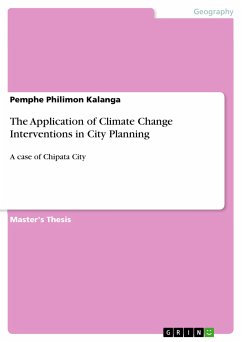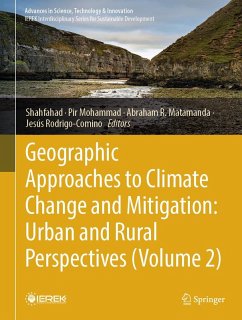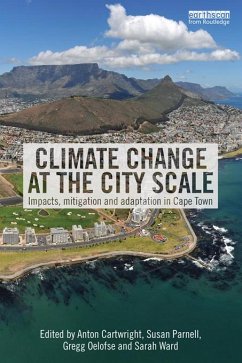
The Application of Climate Change Interventions in City Planning (eBook, PDF)
A case of Chipata City
Versandkostenfrei!
Sofort per Download lieferbar
Statt: 47,95 €**
36,99 €
inkl. MwSt. und vom Verlag festgesetzt.
**Preis der gedruckten Ausgabe (Broschiertes Buch)
Alle Infos zum eBook verschenkenWeitere Ausgaben:

PAYBACK Punkte
0 °P sammeln!
Master's Thesis from the year 2021 in the subject Geography / Earth Science - Demographics, Urban Management, Planning, , course: Climate Change and Sustainable Development, language: English, abstract: The aim of the study was to explore the application of climate change adaptation interventions in city planning for building a resilient city of Chipata. The research objectives were to analyze the climate change adaptation interventions used by city planners, to assess the inclusion of policies and legislations related to adaptation interventions in city planning, and to examine challenges fac...
Master's Thesis from the year 2021 in the subject Geography / Earth Science - Demographics, Urban Management, Planning, , course: Climate Change and Sustainable Development, language: English, abstract: The aim of the study was to explore the application of climate change adaptation interventions in city planning for building a resilient city of Chipata. The research objectives were to analyze the climate change adaptation interventions used by city planners, to assess the inclusion of policies and legislations related to adaptation interventions in city planning, and to examine challenges faced by city residents in relation to climate change effects. Since cities are intense centers of population and are home to over half of the world's assets and economic activities, any impact or disruption, be it natural or human caused, has the impending prospective effect to the majority. For instance, floods will affect vast numbers in the city, while the same degree of floods will affect a few if it occurred in rural set up, since rural households are scattered compared to those in the city. With the pervasive threats of climate change effects on Cities, the application of Climate Change adaption interventions into City Planning is becoming a prime issue. Climate Change will contribute significantly to the multiplication of urban risks and achieving the agenda for 2030 on Sustainable Cities will prove futile without first addressing climate change concerns. The question, however, is, has cities in Zambia integrated climate change concerns in their planning of cities? City planning involves, among other issues, land use which would help to reduce the number of properties at risk to flooding and storm water damage, infrastructure development through building codes and design standards for more resilient structures to flooding. Other factors involved in city planning include; city services, ecological planning, strong and waste management, housing and building improvement, and site plan. Planning of City cannot be circumvented if climate change is to be methodically tacked in cities. While there is an urgent need for urban planners to develop a robust and clear strategy for dealing with climate impacts, there is very little knowledge about how planners and households are able to address the challenges posed by climate change. Further, much attention in climate change fight has centered on national level actions and much of these interventions are done in an ad-hoc manner, with little knowledge about such actions being carried out in particular cities.
Dieser Download kann aus rechtlichen Gründen nur mit Rechnungsadresse in A, B, BG, CY, CZ, D, DK, EW, E, FIN, F, GR, HR, H, IRL, I, LT, L, LR, M, NL, PL, P, R, S, SLO, SK ausgeliefert werden.













